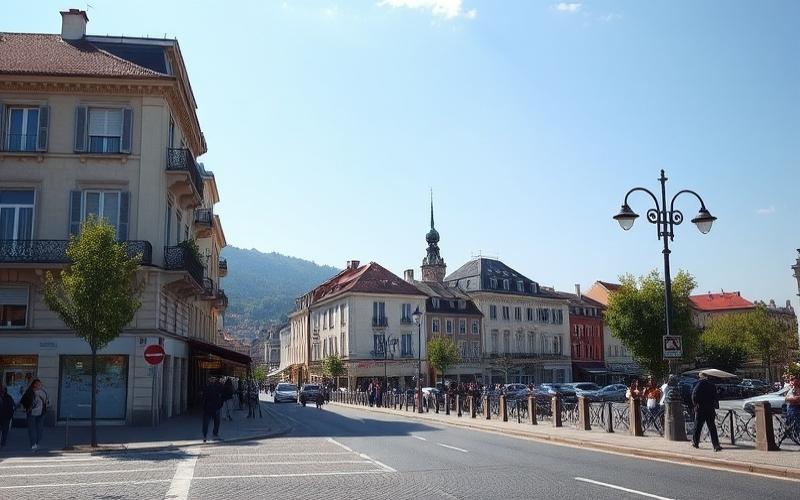
 Published on and written by Cyril Jarnias
Published on and written by Cyril Jarnias
The rise of remote work has transformed the global professional landscape, and Switzerland, with its picturesque scenery and robust digital infrastructure, is emerging as a sought-after destination for digital nomads.
As these itinerant workers flock to Switzerland’s scenic towns, their lifestyles and specific demands are having a notable impact on the country’s rental market.
This article explores how the growing presence of these digital nomads is redefining the local economy and the challenges that property owners and real estate agencies must face to adapt to this new demand.
Rental Market Challenges Faced by Digital Nomads in Switzerland
The boom of digital nomads in Switzerland is disrupting the rental market, particularly in urban areas (Zurich, Geneva, Lausanne) and tourist regions. This new category of tenants is creating both economic opportunities and several major challenges for the sector.
Main Challenges Related to the Massive Arrival of Digital Nomads:
- Increased pressure on the supply of flexible furnished housing, especially in city centers where vacancy rates are often below 1%.
- Marked increase in rents for studios and furnished apartments: exceeding 1,500 CHF/month has become common for small spaces in city centers.
- Scarcity of long-term housing accessible to permanent residents; some neighborhoods see availability significantly decrease while turnover increases in buildings partially converted to short-term rentals or co-living.
- Difficult adaptation of older real estate stock (need for spaces suitable for remote work, included services…).
Summary Table: Market Evolution Under the Influence of Digital Nomads
| Aspect | Before Digital Nomad Boom | After Digital Nomad Boom |
|---|---|---|
| Typical Duration | Months/Years | Several weeks to several months |
| Dominant Supply | Traditional Rental | Flexible Furnished/Co-living |
| Average Studio Price City Center | ~1,100 CHF/month | >1,500 CHF/month |
| Vacancy Rate | ~2% |
Co-living in Switzerland: A Solution for Digital Nomads
Co-living is attracting a growing number of digital nomads in Switzerland, establishing itself as a modern alternative suited to the realities of remote work. This solution appeals due to its flexibility, community aspect, and privileged access to strategic locations.
Reasons for Co-living’s Popularity Among Digital Nomads
- Rental Flexibility: Contracts are generally short-term or monthly, with no long-term commitment or complex administrative procedures.
- Strategic Location: Many spaces are located near major urban centers (Zurich, Geneva) or in iconic natural sites like Lenk or Liddes in the Swiss Alps.
- Active Community: Co-living life facilitates meeting other entrepreneurs, freelancers, and travelers sharing the same lifestyle.
Main Advantages
| Advantage | Description |
|---|---|
| Flexibility | Adaptable stays (from a few weeks to several months), without traditional lease |
| Social & Professional Network | Networking opportunities and collaborations among residents |
| Included Services | Equipped spaces for work (ergonomic desks, meeting rooms), shared kitchen |
| Internet Connectivity | High-speed fiber optic available everywhere |
| Community Life | Organized activities (workshops, outings) promoting integration |
Adaptation to Specific Needs
Swiss co-living spaces are designed to meet the requirements of digital nomads:
- Ergonomic Furniture
- Common areas for work and relaxation
- Ultra-fast internet connection essential for remote work
- Easy access to public transportation and urban amenities
Concrete Examples of Spaces in Switzerland
- Lenk Coliving: Located in the Simmental valley with mountain views; appreciated for its modern facilities combining coworking and sports activities.
- Liddes Coliving: Popular for its friendly atmosphere that easily fosters connections during events or shared meals.
“Staying at coliving spaces is an easy way to make friends and connections while travelling.”
Testimonials also highlight the collaborative spirit: sharing daily life with other independent workers sparks creativity and innovation through constant collective emulation.
Impact on the Swiss Rental Market
The development of co-living significantly influences the local real estate market:
Co-living vs Traditional Rental Comparison
| Criterion | Co-living | Traditional Rental |
|---|---|---|
| Commitment | Flexible | Long-term |
| Furniture/Equipment | Included | Often not included |
| Services | Coworking & social events | Limited |
| Overall Cost | Sometimes higher but all-inclusive | Cheaper but additional fees |
The growing demand is pushing some property owners to convert their properties into structures suitable for flexible work. This sometimes contributes to reducing the traditional supply in the long-term segment in certain cities attractive to digitally active foreigners.
Recent Trends & Statistics
According to Digital Nomad World:
The co-living trend is expected to continue its progression as more professionals opt for increased mobility.
In 2024:
- Notable increase in the number of dedicated spaces (+15% vs 2022)
- Over one-third of new arrivals in these structures are aged between 25 and 40
Digital nomads surveyed consistently cite the international community encountered and administrative simplicity among the determining factors motivating their choice.
Good to Know:
Co-living in Switzerland is favored by digital nomads for its rental flexibility, allowing short or long stays without the constraints of traditional leases. Places like The Collective in Zurich and Village Office in the outskirts offer high-speed internet connectivity and collaborative workspaces, perfectly meeting the professional needs of these mobile workers. Located near major urban centers, these spaces not only facilitate access to economic hubs but also encourage the creation of social and professional networks, enriching the nomadic living experience. A 2022 study shows that 40% of Swiss digital nomads prefer co-living over traditional solutions, thereby reinforcing a rapidly changing rental market. Collected testimonials highlight the appeal of these spaces compared to classic rentals, which often lack flexibility and equipment suitable for digital workers.
The Importance of High-Speed Wi-Fi for Swiss Digital Nomads
Digital nomads have specific needs regarding Internet connectivity, as their lifestyle and productivity entirely depend on reliable and fast Wi-Fi access. High-speed access is crucial for several reasons:
- High-definition video calls (Zoom, Teams) require a stable connection to avoid interruptions or loss of audio and visual quality.
- Sharing and downloading large files (graphic projects, videos, bulky data) require significant bandwidth to reduce waiting times.
- Constant access to online collaborative platforms (Google Drive, Notion, Slack) enables smooth management of remote projects with international teams.
- Automatic cloud synchronization ensures the security of sensitive professional documents.
In Switzerland, the Internet infrastructure is particularly developed. According to the latest sector studies:
| Indicator | Recent Data |
|---|---|
| Fiber Optic Coverage | >90% population |
| Average Speed Observed | 100–200 Mbps |
| Public Wi-Fi Availability | Very High |
Major advantages for digital nomads are:
- An almost unparalleled network reliability in cities like Geneva or Zurich.
- Many tech-friendly coworking spaces offering secure and high-performance Wi-Fi.
- Easy access to local SIMs or eSIMs suitable for international roaming.
However, some challenges remain:
- In some Swiss Alpine or rural regions, access to very high speed may be limited despite good overall national coverage.
- The high cost of some local mobile plans can be a barrier for those who prefer working in isolated locations.
This level of infrastructure strongly influences geographical choice: the majority opt for large urban areas where ultra-fast Internet is guaranteed. This also has a direct impact on the Swiss rental market: the more a region offers efficient and stable connectivity—via modern coworkings or equipped housing—the more it attracts this new flexible tenant profile. Property owners are therefore adapting their offers: listings highlighting “fiber optic included,” shared offices with premium Wi-Fi…
Key Takeaway:
Without a reliable Internet connection, no work: it’s often the first thing a digital nomad checks upon arriving in a new country.
The continuous development of the Swiss digital network not only favors the arrival but also the long-term settlement of digital nomads—thus bringing local economic dynamism through their increased presence in the temporary real estate market.
Good to Know:
For Swiss digital nomads, access to high-speed Wi-Fi is essential to their productivity, supporting essential activities like video conferencing, sharing large files, and continuous use of collaborative platforms. In Switzerland, although Internet infrastructure is generally advanced, ensuring fast and reliable connections in most major cities, rural areas may present challenges in terms of coverage. According to a recent study, Switzerland ranks among the world leaders in Internet connectivity, attracting digital nomads eager for constant access to work tools necessary for their professional activities. This attractiveness has a direct impact on the rental market, with well-served regions with quality Internet being more sought after and thus seeing increased demand. Initiatives to expand high-speed coverage, particularly in more remote regions, could not only diversify the location choices of digital nomads but also strengthen their economic contribution, thereby stimulating the housing market in these areas.
Short-Term Rental Contracts: How Switzerland Adapts to Digital Nomads
The growing influx of digital nomads into Switzerland has profoundly influenced the evolution of short-term rental contracts. This trend translates into a multiplication of demands for flexible, furnished housing suitable for remote work, while posing several regulatory and economic challenges.
Legislative and Regulatory Evolution
- Switzerland does not yet offer a specific visa for digital nomads; only EU/EEA citizens can stay up to three months without restrictions thanks to freedom of movement. Beyond that, it is necessary to obtain another permit suitable for extended stays or independent activity.
- Swiss authorities are currently examining various adaptations to harmonize the rental market with this new international demand, although legislation remains more restrictive than in Portugal or other European countries that already offer a “digital nomad visa.”
- Some cities are considering implementing quotas on short-term rentals to avoid saturation of the traditional residential market.
Initiatives by Property Owners and Platforms
- Property owners now prefer flexible leases (from a few weeks to several months), often renewable without long-term commitment.
- The supply has expanded with a majority of fully furnished apartments including high-speed internet connection, spaces dedicated to remote work, and additional services (cleaning, maintenance).
- Platforms like Airbnb or Booking.com facilitate these processes through simplified reservation management and clearly identified “work-friendly” options.
Adaptations Specific to Digital Nomads’ Needs
List of major adaptations:
- Increased flexibility on minimum/maximum lease duration
- Guaranteed access to fast internet
- Common or private spaces arranged for coworking
- Turnkey services: laundry, weekly cleaning, technical assistance
Challenges Faced by the Rental Market
Summary table:
| Challenge Encountered | Explanation |
|---|---|
| Rent Inflation | Rapid increase due to high demand in urban centers |
| Local Saturation | Tourist/innovative cities see their rental stock strained |
| Pressure on Local Housing | Increased difficulty for classic residents (students/families) |
In popular cities like Zurich or Geneva—highly attractive to international mobile workers—these phenomena lead to an imbalance between short-term rentals intended for foreigners and access to affordable housing for local residents.
Emerging Economic Opportunities
Non-exhaustive list:
- Growth of the real estate sector dedicated to premium temporary stays
- Accelerated development of hybrid co-living/coworking spaces throughout the country
- Increased valuation of real estate assets through digital optimization (smart management, home automation)
Swiss stakeholders are also betting on off-season tourist diversification thanks to extended stays generating local economic added value (restaurants, soft mobility).
The massive arrival of digital nomads therefore acts as a catalyst: it pushes both contractual and technological innovation among all Swiss real estate players.
This dynamic, however, requires continuous vigilance regarding social risks linked to the increased cost of traditional housing in some particularly coveted areas.
Good to Know:
In response to the influx of digital nomads, Switzerland has adjusted its short-term rental contracts by implementing legislative and regulatory adaptations to facilitate these stays. Swiss authorities have established more flexible guidelines regarding the duration of stays, while property owners, supported by platforms such as Airbnb, are increasingly offering furnished housing, equipped for remote work and adaptable in terms of rental duration. However, this trend leads to rent inflation and saturation in some popular cities like Zurich or Geneva. Despite these challenges, it creates significant economic opportunities for the real estate sector, which benefits from the increased demand for modern and flexible accommodation solutions.
Disclaimer: The information provided on this website is for informational purposes only and does not constitute financial, legal, or professional advice. We encourage you to consult qualified experts before making any investment, real estate, or expatriation decisions. Although we strive to maintain up-to-date and accurate information, we do not guarantee the completeness, accuracy, or timeliness of the proposed content. As investment and expatriation involve risks, we disclaim any liability for potential losses or damages arising from the use of this site. Your use of this site confirms your acceptance of these terms and your understanding of the associated risks.

















































